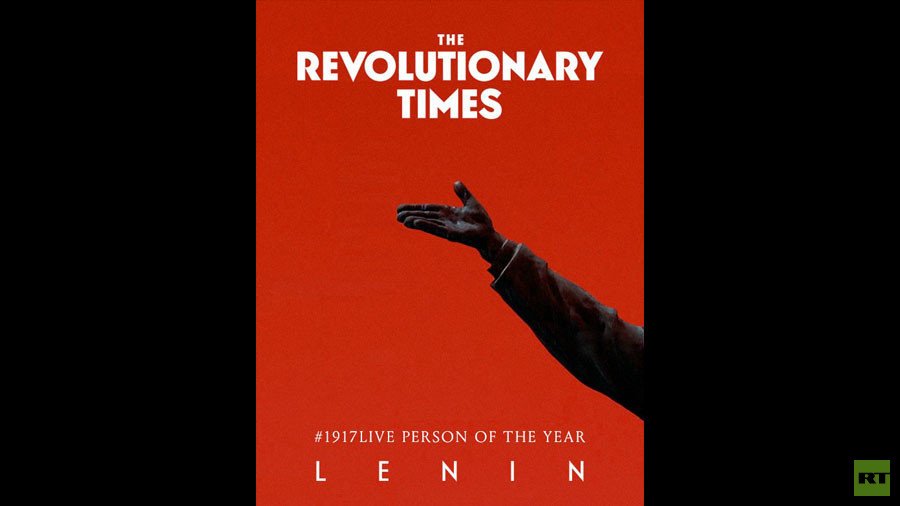Person of the year on #1917LIVE, as chosen by you

And there you have it: the winner of our person of the year for 1917 – as per your votes – is none other than Vladimir Lenin: a man as uncompromising in his beliefs as he is in the resolve to see the mission through.
As our historical re-enactment of the Russian Revolution draws to a close, we asked our readers to sound off on who they thought was the most interesting and influential among our project’s characters. The choices included Vladimir Lenin, Alexander Kerensky, Tsar Nicholas II and Mata Hari.
Who is the Person of the Year 1917? VOTE for @NicholasII_1917@Kerensky_1917@VLenin_1917@Mata_Hari_1917#1917LIVE
— Revolutionary Times (@RT_1917) December 4, 2017
After the tumultuous events of the February Revolution, the hungry and weary Russian people cried out for a program that would amount to more than rhetoric full of promise of an economic and social liberalization. Lenin was to become the face of that program, as he understood the underlying causes of people’s problems, and how to tackle them.
This was in stark contrast to the provisional government – which replaced the autocratic rule of Nicholas II, but addressed burning issues in a very cosmetic way, so as to keep up the legalistic façade of a Western democracy. Needless to say, Russia had nowhere near the societal structure to resemble that.
Bourgeoisie used to swindle people with its millions, called this power-play ‘freedom’. We're breaking away from bourgeoisie and its ‘freedom’ #1917LIVE
— Vladimir Lenin (@VLenin_1917) December 4, 2017
Something that few people actually remember is that the Bolsheviks did not actually have a concrete program; rather, they borrowed elements of Menshevik and SR ideas. But what the others had in college smarts, the Bolsheviks more than made up for in political perseverance. Lenin understood that two things needed to be done immediately to upset the power balance in favor of Russia’s working and fighting population: exit the Great War and feed the starving population – solving inherent, persistent inequalities through agrarian reform and a redistribution of land.
READ MORE: Lenin, Romanov, Kerensky, Mata Hari: Vote for #1917LIVE Person of the Year
The war and the economy were inextricably tied, so the Bolsheviks had their work cut out for them.
Victorious Russian revolution raises the issue of peace point-blank: it’s YES or NO. All warring states should answer that simple question #1917LIVE
— Vladimir Lenin (@VLenin_1917) November 28, 2017
At the end of the 19th century, the Russian Empire – despite its projected growth in the preceding years – was an underdeveloped social system of absolute monarchy, where only the elites had the sense that they belonged to a European civilization, like France or the UK. It was only a matter of time until the working classes rose up – and Lenin’s Bolsheviks were instrumental in seizing upon that popular discontent.
Bourgeoisie sabotage people's rule! Working people can only rely on themselves. Nation faces extremely heavy times, but we think BIG. We trust people’s creativity & the strength of united masses #1917LIVE
— Vladimir Lenin (@VLenin_1917) December 6, 2017
In the eight months since the February Revolution, Russia was in Dual Rule limbo, whereby the provisional government had had to share power with the Petrograd Soviet. This gave the Bolsheviks an opportunity to push forward a leftist agenda through the Soviets – regional bodies representing workers and soldiers.
True democracy means right of voters to recall elected representatives, including Constituent Assembly; Soviets can organize local re-elections #1917LIVE
— Vladimir Lenin (@VLenin_1917) December 2, 2017
Issuing near-daily writings through Pravda and other news vehicles, the Bolsheviks were able to eventually sway public opinion to such an extent that the government of Alexander Kerensky had run out of forces loyal to them. This finally resulted in the comparatively bloodless October Revolution, bringing Lenin and his group to power, and changing the course of Russian (and global) political development forever.
Vladimir Lenin is Revolutionary Times’ Person of the Year 1917 @VLenin_1917#1917LIVE#TimePersonOfTheYear#TIMEPOYpic.twitter.com/qyO8ryf9sO
— Revolutionary Times (@RT_1917) December 6, 2017
RT’s #1917LIVE and #1917CROWD projects is the first historical re-enactment of its kind, allowing users to don the guise of a wartime figure of their choice. The project received a total of six nominations and four prizes for its innovative use of Twitter. Aside from winning ‘Best in Education’, as well as taking Gold for ‘Best Twitter Presence’ at the Shorty Social Good Awards. RT also received two bronzes at the Epica Awards in the Media and Online: Social Networks categories, as well as securing a Highly Commended notice for Most Innovative Use of Social at the Social Buzz Awards.












